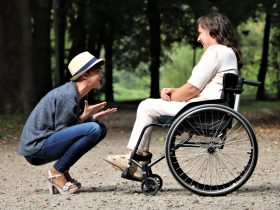Is Bipolar disorder hereditary? Well, bipolar disorder is a mental illness that causes manic episodes and depressive episodes. These mood swings can be influenced by their environment, lifestyle, and stress levels. Some people are genetically predisposed to bipolar disorder based on family history. Studies have shown that people with a first-degree relative who has bipolar disorder are more likely to develop the condition themselves. In fact, up to 40% of those diagnosed with bipolar disorder have family members with the disease.
What are the symptoms one has if he/she is bipolar?
Did you know that bipolar is an illness of extremes? It involves intense emotions and can be highly disruptive to your life. Bipolar disorder is a mental illness that affects the way you think, feel, and behave. It includes periods of mania (excited/hyperactive) and depression (down/unhappy). It causes moods to swing from manic highs to depressive lows. People with bipolar disorder have periods of depression, but they also experience episodes of mania where they may be overly happy or irritable and restless
For more details check out our article on what is bipolar disorder?
How does bipolar affect the mind and mood?
Bipolar disorder is a mental health condition that causes shifts in mood, energy, and activity levels. It can be hard to understand what’s going on with your brain when you’re bipolar. The symptoms of bipolar are different for everyone. Some people experience depression or mania as their only symptom while others have both at the same time. Depression is more common than mania but it affects each person differently.
Is bipolar disorder hereditary?

The short answer is yes. Although, it’s important to note that it’s NEVER certain you’ll inherit a mental health issue from your parents. Why? It is hereditary because it’s passed down from one generation to the next. Also, it can be inherited through genes or chromosomes, which means that a person with bipolar disorder has a 50% chance of passing on the illness to their children. Thus, there’s a 50% chance they didn’t pass it onto their children. And Just because you have a gene or predisposition for something, this doesn’t mean your body will express it.
You might have the ‘gene’ for bipolar, but this doesn’t mean you will be bipolar.
The risk for developing bipolar disorder is also increased if there are other family members who have been diagnosed with this condition. It can be inherited from a parent or grandparent, so it’s important to know your family medical history.
Is bipolar inherited from mother or father?
Bipolar, like all hereditary mental health conditions, can be passed down through the mother or the father. If you have bipolar disorder, there’s a 50% chance that one of your parents will also have the condition. You may inherit bipolar disorder through genes and chromosomes from both parents. And while it’s true that you have a higher chance of getting bipolar disorder if you have family members with the condition, any person can develop bipolar disorder, it’s not just genetic.
What are some warning signs of bipolar disorder?
If you’re concerned about the mental health of a child or partner, it may be helpful to talk to them about their feelings and thoughts. This can be hard, and so it’s good to be observant and look out for any warning signs of bipolar diosrder. Here are a few:
- Mood swings
- Irritability or anger
- Difficulty sleeping, especially when the mood changes abruptly
- Increased activity levels (either too much or not enough)
- Racing thoughts and talking a lot more than usual, but not making sense to others
- Unexpected weight loss or gain
- Increase in risky behavior
For more information, check out our blog on what does it feel like to have bipolar? and have a look at the video below.



















2 Comments